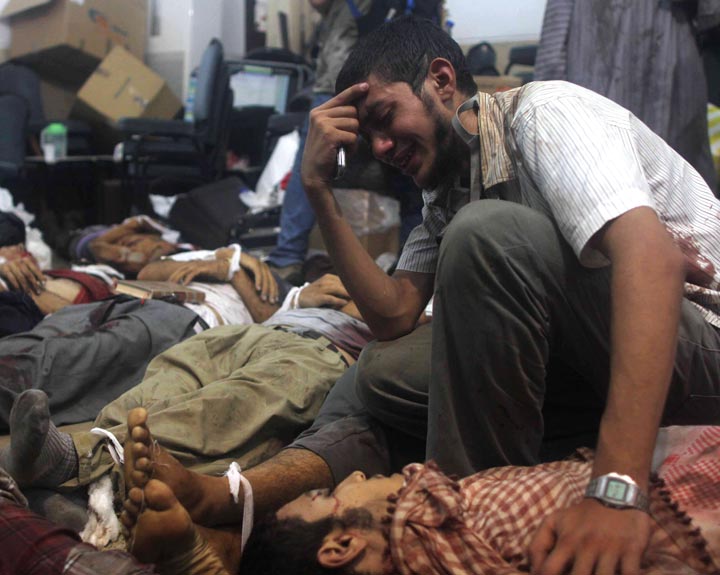VANCOUVER – A former aide to the government of deposed president Mohammed Morsi calls the deadly police crackdown on protesters an act of “genocide.”

Ahmad Eleman, who currently lives in Toronto, was an adviser to the Ministry of Investment and consulted the presidential team on tourism and aviation matters.
He said he doesn’t believe the Ministry of Health’s official death toll, saying people he has contacted put the death toll in the thousands.
The government-reported death toll, as of 4 p.m. ET, stood at 638, with a further 3,994 people injured. Included in the death toll were 43 security officials.
Read more: Egypt authorizes police use of deadly force as death toll climbs past 600
Reuters has also questioned the official death toll, reporting in a story on Thursday there were more than 200 bodies laid out at the Al-Imam, mosque, in Nasr City, that weren’t factored in to the government’s numbers.
“Typically, Health Ministry casualty tolls include only bodies that have passed through hospitals, indicating the rows of dead at the mosque are uncounted in any official figures,” Reuters reported.
Reuters reported some of the bodies were “charred and with smashed skulls, others riddled with bullet holes in their heads and chests.”
Health Ministry spokesman Mohammed Fathallah said earlier that the blood-soaked bodies lined up in the El Imam mosque were not included in the official death toll. It was not immediately clear if the new figures included the ones at the mosque, The Associated Press (AP) reported.
AP also reported the estimates by the Muslim Brotherhood appeared high in light of footage by regional and local TV networks.
View our full coverage of the situation in Egypt by clicking here
Eleman said the government was not clearing out the camps, but “cleansing” the protesters in what was the deadliest day of violence since the 2011 uprisings that ended the 30-year rule of Hosni Mubarak.
“This is a return to before even the 25th of Jan. 2011. This is a return to the ex-regime, but this is not the same ex-regime. This is a much worse and more bloody ex-regime that’s back for revenge,” he said.
Egypt’s interim Prime Minister Hazem el-Beblawi defended how the police dealt with the protesters, saying they “showed high levels of self-restraint” in their actions.
“There was a need for the state to intervene with an extraordinary measure which is the emergency law. God willing, we will continue. We will build our democratic, civilian state,” Al-Jazeera reported Beblawi saying in a televised address.
But the dismantling of the two camps — with the aid bulldozers, tear gas and guns — and the deaths of civilians were met with international condemnation and prompted interim Vice-President Mohammad ElBaradei to step down.
Eleman admits Morsi and the Muslim Brotherhood did not meet the expectation of the Egyptian people.
“There were huge disappointments,” he said. “No one can ever say the president didn’t make mistakes.”
But, he feels it was impossible to undo 60 years of authoritarian rule and institute democratic change and said the solution to fixing the problems with the government was not to wipe it out.
“This is not about democracy,” Eleman said. “This whole point of democracy was to bring in the great values — whether it is like the Canadian values that we stand up for freedom and dignity and respect — and this was all lost with the military coup.”
Eleman said when the military took over the country on July 3, in what has been called a coup d’etat by some foreign officials but not the U.S., rifts in Egyptian society were created that will take years to get over.
He thinks the tables could be quickly turned on the military.
“The first revolution brought in a change of regime,” he said. “But the biggest problem is right now that this is not… up to negotiation because there is blood in the middle and there are people that are extremely angry.”
Read more: Key events in Egypt’s revolution and upheaval
Even though Eleman said there are many people in Egypt that are happy with the military taking control of the government and taking down the pro-Morsi protest camps, he said dealing with the situation with “an iron fist” will only lead to bringing back a dictatorship.
Beblawi said Wednesday the government is committed to holding another election, which would come in 2014, under the military-drafted roadmap for the country.
Morsi, as leader of the Muslim Brotherhood, was the country’s first democratically-elected president of Egypt.
*With files from The Associated Press




Comments